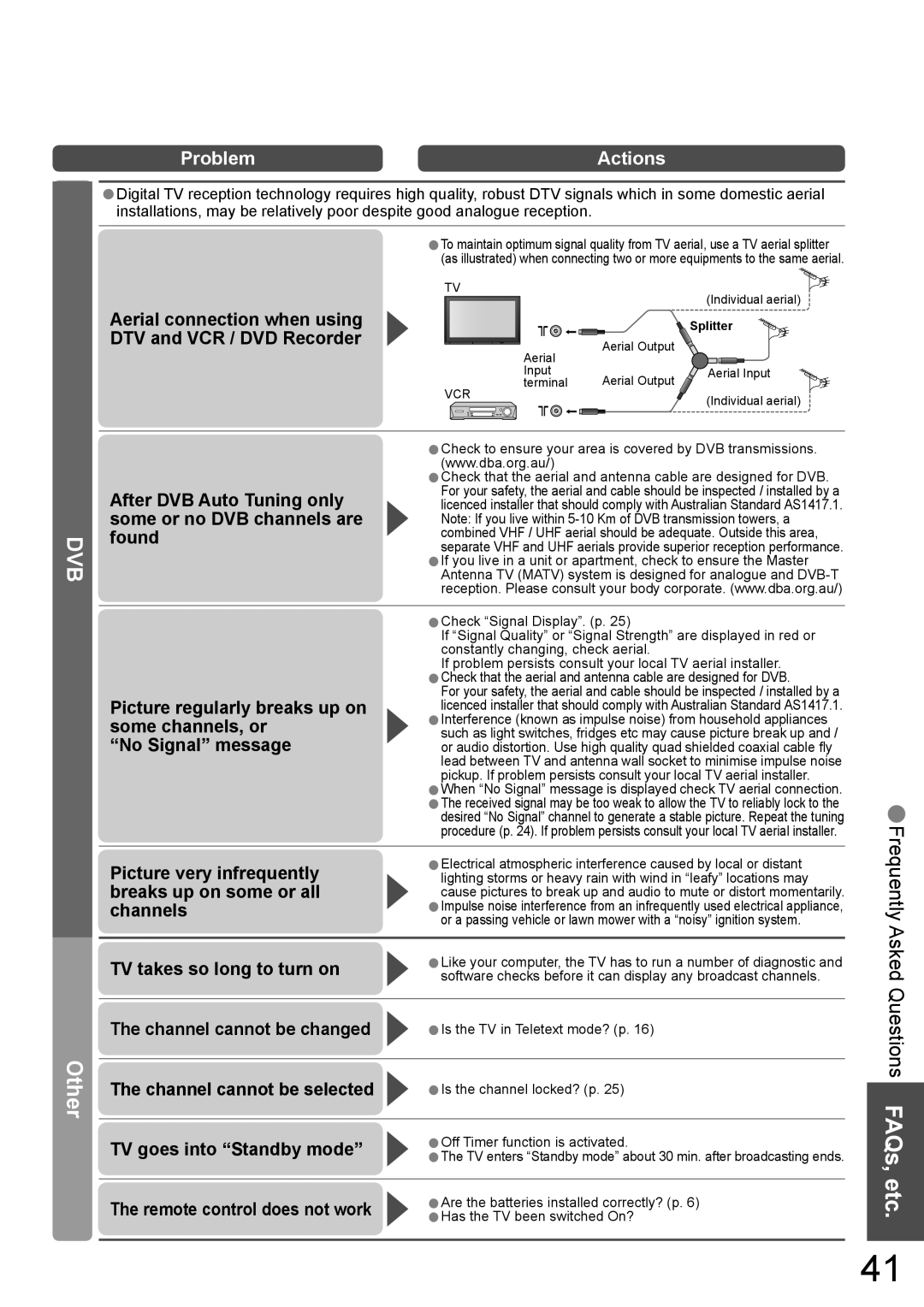
Problem | Actions |
•Digital TV reception technology requires high quality, robust DTV signals which in some domestic aerial installations, may be relatively poor despite good analogue reception.
Aerial connection when using DTV and VCR / DVD Recorder
•To maintain optimum signal quality from TV aerial, use a TV aerial splitter (as illustrated) when connecting two or more equipments to the same aerial.
TV
|
| (Individual aerial) | ||||
|
| Splitter | ||||
Aerial | Aerial Output |
|
|
|
|
|
|
|
|
|
|
| |
|
|
|
|
|
| |
Input | Aerial Output |
| Aerial Input | |||
terminal |
|
|
|
|
| |
VCR |
| (Individual aerial) | ||||
|
| |||||
|
|
| Check to ensure your area is covered by DVB transmissions. | |
|
| •(www.dba.org.au/) | ||
|
|
| Check that the aerial and antenna cable are designed for DVB. | |
| After DVB Auto Tuning only | •For your safety, the aerial and cable should be inspected / installed by a | ||
|
| licenced installer that should comply with Australian Standard AS1417.1. | ||
| some or no DVB channels are |
| Note: If you live within | |
DVB | found |
| combined VHF / UHF aerial should be adequate. Outside this area, | |
| separate VHF and UHF aerials provide superior reception performance. | |||
|
| If you live in a unit or apartment, check to ensure the Master | ||
| •Antenna TV (MATV) system is designed for analogue and | |||
|
|
| reception. Please consult your body corporate. (www.dba.org.au/) | |
|
|
|
| |
|
|
| Check “Signal Display”. (p. 25) | |
|
| •If “Signal Quality” or “Signal Strength” are displayed in red or | ||
|
|
| constantly changing, check aerial. | |
|
|
| If problem persists consult your local TV aerial installer. | |
|
|
| Check that the aerial and antenna cable are designed for DVB. | |
| Picture regularly breaks up on | •For your safety, the aerial and cable should be inspected / installed by a | ||
|
| licenced installer that should comply with Australian Standard AS1417.1. | ||
| some channels, or |
| Interference (known as impulse noise) from household appliances | |
| •such as light switches, fridges etc may cause picture break up and / | |||
| “No Signal” message |
| or audio distortion. Use high quality quad shielded coaxial cable fly | |
|
|
| lead between TV and antenna wall socket to minimise impulse noise | |
|
|
| pickup. If problem persists consult your local TV aerial installer. | |
|
|
| When “No Signal” message is displayed check TV aerial connection. | |
|
| •The received signal may be too weak to allow the TV to reliably lock to the | ||
|
| •desired “No Signal” channel to generate a stable picture. Repeat the tuning | ||
|
|
| procedure (p. 24). If problem persists consult your local TV aerial installer. | |
| Picture very infrequently |
| Electrical atmospheric interference caused by local or distant | |
| •lighting storms or heavy rain with wind in “leafy” locations may | |||
| breaks up on some or all |
| cause pictures to break up and audio to mute or distort momentarily. | |
| channels |
| Impulse noise interference from an infrequently used electrical appliance, | |
| •or a passing vehicle or lawn mower with a “noisy” ignition system. | |||
| TV takes so long to turn on |
| Like your computer, the TV has to run a number of diagnostic and | |
| •software checks before it can display any broadcast channels. | |||
| The channel cannot be changed | • | Is the TV in Teletext mode? (p. 16) | |
|
| |||
Other |
|
|
| |
The channel cannot be selected | • | Is the channel locked? (p. 25) | ||
| ||||
|
| |||
TV goes into “Standby mode” | Off Timer function is activated. | |
••The TV enters “Standby mode” about 30 min. after broadcasting ends. | ||
| ||
The remote control does not work | Are the batteries installed correctly? (p. 6) | |
••Has the TV been switched On? | ||
|
•Frequently Asked Questions FAQs, etc.
41
